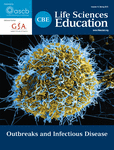Implementation of the Peer-Led Team-Learning Instructional Model as a Stopgap Measure Improves Student Achievement for Students Opting Out of Laboratory
Abstract
In entry-level university courses in science, technology, engineering, and mathematics fields, students participating in associated laboratory sessions generally do better than those who have no related lab classes. This is a problem when, for various reasons, not enough lab sections can be offered for students and/or when students opt out of optional available lab courses. Faced with such a situation, this study evaluated the efficacy of the peer-led team-learning (PLTL) instructional model as a potential method for narrowing the achievement gap among undergraduate students electing not to enroll in an optional laboratory component of an introductory biology course. In peer-led workshops, small groups of students participated in solving problems and other activities that encouraged active learning. Students led by peer leaders attained significantly higher exam and final course grades in introductory biology than comparable students not participating in PLTL. Among the introductory biology students who opted not to enroll in the optional lab course, those who participated in PLTL averaged more than a letter grade higher than those who did not. This difference was statistically significant, and the PLTL workshops almost entirely closed the achievement gap in lecture exam and final grades for students who did not take the lab.



